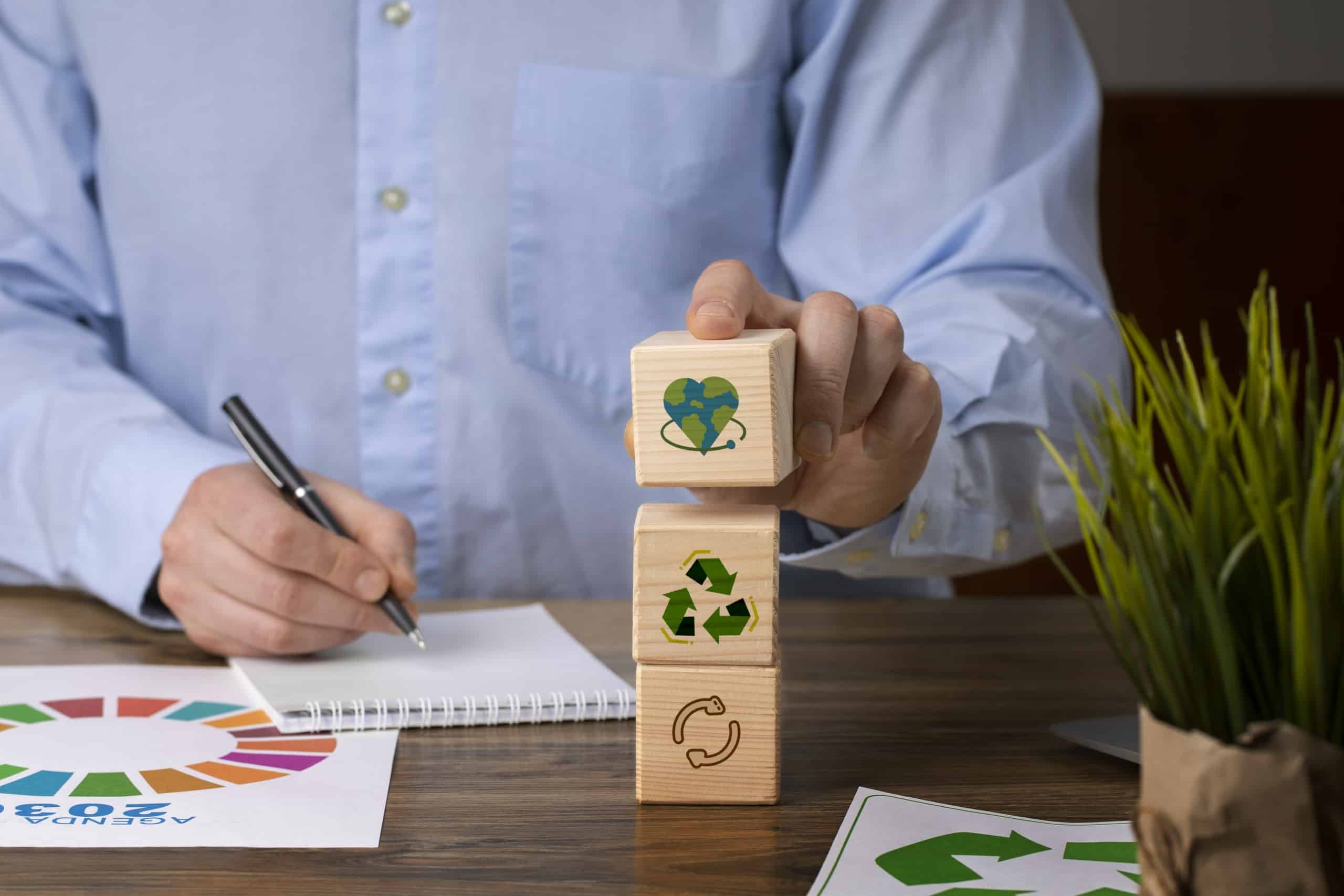1. Understanding Sustainable Packaging
Efficient packaging is an essential element of contemporary production, especially in sectors such as wet wipes, where excessive packaging may have a substantial negative effect on the environment. Sustainable packaging aims to reduce the environmental impact by using eco-friendly materials and procedures. This entails minimizing packing, using recyclable or biodegradable materials, and ensuring that the whole packaging process, from manufacture to disposal, has a negligible environmental footprint.
Wet wipes makers may use many techniques to include sustainable packaging practices. One of the main strategies is to use products that are properly sourced. This may include using paper and cardboard sourced from forests that have been certified by the Forest Stewardship Council (FSC), guaranteeing that the wood used has been obtained sustainably. In addition, wet wipes manufacturers are progressively using cutting-edge materials such as biodegradable plastics or compostable films that decompose faster and with more environmental safety compared to conventional plastics.
The design process is another crucial component of sustainable packaging. Wet wipes manufacturers must take into account both the composition of the materials used and the methods used in the production and transportation of the packaging. This might include refining the design to minimize the use of surplus materials, enhancing the efficiency of the packing process, and reducing the carbon footprint associated with transportation. For instance, using lighter and more compact packaging may effectively decrease transportation emissions and expenses.
In addition, sustainable packaging not only provides environmental advantages but also satisfies the increasing customer desire for eco-friendly goods. As the level of consciousness about environmental concerns rises, people are more inclined to choose items that are according to their own beliefs and principles. For wet wipes manufacturers, using sustainable packaging may improve brand recognition and customer loyalty, giving them a competitive advantage in the market. Wet wipes manufacturers may fulfill environmental conservation goals, comply with regulations, and appeal to the growing eco-conscious customer base by adopting sustainable packaging practices.
2. Key Certifications and Standards
For wet wipes manufacturers, it is vital to secure the appropriate certifications and adhere to established standards to ensure sustainable packaging. These certifications serve to both showcase a dedication to environmental stewardship and provide assurance to customers and regulatory agencies on the sustainability of your packaging practices. In this article, we will examine many important certifications and standards that wet wipes producers may use to adhere to industry best practices and fulfill market requirements.
Forest Stewardship Council (FSC) Certification
The Forest Stewardship Council (FSC) accreditation is highly regarded as a prominent benchmark for the conscientious management of forests. Products using the FSC mark guarantee customers that the materials used originate from forests that are maintained responsibly, with due regard for the environment, animals, and the people who rely on these forests. Wet wipes manufacturers may guarantee that their packaging materials promote sustainable forestry practices by choosing paper and cardboard that are certified by the Forest Stewardship Council (FSC). This not only aids in the conservation of trees but also satisfies the growing customer demand for eco-friendly items.
Compostable Packaging Certification
Compostable packaging certifications, such as OK Compost HOME and OK Compost INDUSTRIAL from TÜV Austria, confirm that packaging is capable of decomposing into natural components in compost settings, without leaving any harmful residues. The OK Compost HOME certification signifies that the packaging is capable of decomposing in a domestic composting system, while the OK Compost INDUSTRIAL certification is intended for packaging that necessitates the use of industrial composting facilities. Obtaining these certifications allows wet wipes makers to verify that their packaging solutions support a circular economy by securely returning to the environment, minimizing landfill trash, and satisfying strict environmental criteria.
Cradle to Cradle Certified™
Cradle to Cradle Certified™ is an internationally recognized standard that assesses the safety and sustainability of items designed for the circular economy. This accreditation evaluates items based on five categories: material health, material reuse, renewable energy, water stewardship, and social justice. Wet wipes manufacturers who want to get this certification must provide evidence that their packaging materials are not harmful to human and environmental well-being, can be continuously recycled without losing their worth, and are manufactured using renewable energy sources and fair labor methods. This comprehensive strategy not only aids in attaining sustainability objectives but also boosts brand reputation by demonstrating a dedication to ongoing improvement and environmental responsibility.
Plastic Free Certification
The Plastic Free Certification, offered by A Plastic Planet, guarantees that packaging is completely devoid of traditional plastics, promoting the use of alternative, environmentally-friendly materials. Amidst the global challenge of plastic pollution, the importance of this accreditation has grown significantly. Wet wipes manufacturers may fulfill the increasing customer demand for plastic-free goods and reduce their environmental impact by using packaging that is free of plastic. This accreditation guarantees customers that the packaging is devoid of detrimental plastics and promotes a more environmentally friendly future.
By obtaining these certifications, wet wipes manufacturers may ensure both adherence to environmental requirements and alignment with the current market emphasis on sustainability. These certifications provide as a definitive and reliable indication to customers and partners that the firm is dedicated to ethical and sustainable packaging practices. This may result in increased customer loyalty, entry into untapped areas, and a substantial competitive edge in a growing environmentally-conscious industry.
3. Regulatory Requirements and Market Trends
Effectively navigating the regulatory environment is a crucial component in implementing sustainable packaging for wet wipes manufacturers. Regulatory standards differ depending on the location, but their main objective is typically to minimize environmental effects and encourage the adoption of sustainable practices. Comprehending and adhering to these standards is not only essential to evade legal consequences but also advantageous for maintaining competitiveness in the industry.
European Union Regulations
The European Union (EU) has very rigorous laws about packaging and trash management. The primary objective of the EU’s Packaging and Packaging Waste Directive is to mitigate the generation of packaging waste, foster the practice of recycling, and guarantee that packaging materials may be reused or recovered. Wet wipes manufacturers in the EU must verify that their packaging adheres to these regulations, which may include using recyclable or biodegradable materials and minimizing the total amount of packaging.
Furthermore, alongside the Packaging and Packaging Waste Directive, the European Union has enforced the Single-Use Plastics Directive, which primarily focuses on items that contribute to the pollution of marine ecosystems. Wet wipes, which often include plastic fibers, are covered by this rule. Wet wipes manufacturers are now obligated to guarantee that their goods and packaging are devoid of detrimental plastics and that they prominently display informative labels on the product’s ecological consequences. Adhering to these standards is crucial for gaining access to the European market and for supporting worldwide initiatives to mitigate plastic waste.
US Regulations
Sustainable packaging standards in the United States are regulated by both federal and state legislation. The Green Guides, issued by the Federal Trade Commission (FTC), provide wet wipes manufacturers with clear instructions on how to effectively communicate environmental marketing claims. These principles guarantee that assertions on sustainability, such as “biodegradable” or “recyclable,” are accurate and supported by evidence. Complying with these criteria is crucial for wet wipes makers to avoid allegations of greenwashing and establish customer confidence.
State requirements may be strict, particularly in jurisdictions such as California, where laws require the use of packaging that can be recycled or composted. The California Recycling and Plastic Pollution Reduction Act establishes specific goals for decreasing the use of disposable plastic packaging and requires that all packaging be capable of being recycled or composted by the year 2030. It is essential for wet wipes makers that want to market their goods in several US states to be well-informed and adhere to the particular requirements of each state.
Market Trends
In addition to meeting legal requirements, there is a growing preference in the market for sustainable packaging. Consumers are more aware of environmental issues and are making purchase choices that align with their desire for ecologically beneficial items. There is a notable trend towards increased need for transparency in packaging, as customers are seeking information about the origin of materials and their environmental effects.
Wet wipes producers may capitalize on these developments by embracing and advocating for their environmentally-friendly packaging techniques. Emphasizing certifications like FSC or Plastic Free and offering details on the lifetime of packaging materials may augment the attractiveness of a brand. Furthermore, to maintain their position in the supply chain, manufacturers must adhere to the sustainable packaging objectives set by large retailers and brands.
Investors and stakeholders are placing growing importance on sustainability, seeing it as a crucial element for long-term viability and success. Wet wipes manufacturers that do not implement sustainable practices face the possibility of losing their market share and investor trust. On the other hand, individuals or businesses who adopt sustainable practices might gain advantages such as more investment, customer loyalty, and market opportunities.
Essentially, wet wipes manufacturers that want to use sustainable packaging must comprehend and comply with regulatory obligations. Staying updated on market trends allows producers to not only adhere to rules but also satisfy customer expectations and take advantage of the increasing demand for environmentally friendly goods. Implementing this proactive strategy may greatly improve brand reputation, expand market reach, and ensure long-term company viability.
4. Benefits of Sustainable Packaging Certifications
Sustainable packaging certifications provide several advantages for wet wipes manufacturers, above just adherence to regulations. These certifications have the potential to bolster brand image, expand market access, mitigate environmental impact, and provide enduring cost benefits. Below is a comprehensive analysis of the benefits associated with acquiring sustainable packaging certifications.
Improved Brand Reputation
An important advantage of sustainable packaging certifications is the improvement of brand image. Currently, customers in the market are becoming more conscious of environmental concerns and show a preference for businesses that exhibit a dedication to sustainability. Certifications such as FSC, Cradle to Cradle Certified™, and Plastic Free provide reliable evidence that a company is committed to ethical and environmentally-friendly practices. Including these certificates on packaging may greatly enhance brand impression, cultivate customer confidence, and establish loyalty. When consumers perceive that a brand places a high importance on environmental concerns, they are more inclined to choose that brand over its rivals, resulting in a rise in sales and market dominance.
Market Access
Acquiring certifications for sustainable packaging may provide new market prospects and aid in meeting store requirements. Several prominent retailers and distributors now mandate that their suppliers adhere to certain sustainability criteria. By obtaining certifications such as OK Compost HOME and OK Compost INDUSTRIAL, makers of wet wipes may guarantee that their goods meet the requirements of these merchants. Moreover, certificates may help individuals get access to environmentally concerned businesses and locations that have strict environmental restrictions. Expanding market access may lead to higher revenue and company expansion, as producers can reach a larger customer base that values sustainability.
Ecological Consequences
Sustainable packaging certifications assist producers in reducing their impact on the environment. Certifications such as the Cradle to Cradle Certified™ prioritize several facets of sustainability, such as the health of materials, the potential to be recycled, and the use of renewable energy. By following these guidelines, makers of wet wipes may minimize waste, decrease greenhouse gas emissions, and preserve natural resources. Using FSC-certified paper guarantees that the raw materials come from forests that are managed sustainably, which helps to protect biodiversity and maintain the health of the forest. Compostable certificates guarantee that packaging materials decompose safely in composting conditions, therefore minimizing landfill waste and soil contamination. The environmental advantages of these add to wider sustainability objectives and showcase a company’s dedication to safeguarding the world.
Financial Savings
Although there may be upfront costs associated with adopting sustainable packaging, it may ultimately result in substantial long-term cost reductions. Certified sustainable packaging often entails optimizing material use, resulting in decreased packing volume and weight. Utilizing lighter and more compact packaging may reduce production and transportation costs by minimizing the energy required for their creation and transit. Furthermore, the use of sustainable packaging may effectively decrease expenses associated with garbage disposal. Compostable packaging may undergo processing in composting facilities, which are often more cost-effective than conventional trash disposal techniques. In addition, certifications may assist producers in avoiding fines and penalties related to non-compliance with environmental requirements, hence enhancing cost savings.
Strategic Advantage
Obtaining sustainable packaging certifications may provide a significant advantage in a competitive market. As customers grow more environmentally aware, they actively search for items that are in line with their ideals. Wet wipes manufacturers who can prominently showcase certificates such as Plastic Free or OK compost are likely to appeal to these customers. Moreover, as an increasing number of organizations embrace sustainable practices, possessing certifications may set a brand apart, demonstrating its position as a frontrunner in sustainability. Having this competitive advantage may strengthen the company’s position in the market and guarantee long-term success in the industry.
Improved Supply Chain Relationships
Obtaining sustainable packaging certifications helps enhance the rapport with suppliers and partners. Nowadays, several wet wipes manufacturers are giving high importance to sustainability in their supply chains, and certifications may enhance the appeal of manufacturers as potential partners. Wet wipes manufacturers may foster deeper and more cooperative partnerships with suppliers, retailers, and distributors that have similar values by showing a strong dedication to sustainability. This may result in increased stability in supply chains, improved contractual conditions, and enhanced cooperation in the development of sustainable practices.
To summarize, wet wipes manufacturers may get significant advantages from obtaining sustainable packaging certifications. These certifications are essential assets in today’s eco-conscious market as they enhance company image, extend market access, reduce environmental impact, and achieve cost savings. Wet wipes manufacturers may guarantee adherence to regulations, fulfill customer expectations and establish themselves as industry frontrunners by investing in sustainable packaging and acquiring appropriate certifications.
5. Steps to Achieve Certification
Obtaining certification for sustainable packaging involves a series of steps that need meticulous preparation, dedication, and ongoing improvement. Wet wipes producers may adhere to a systematic process to effectively get certifications and ensure their activities are in line with sustainability requirements.
1. Evaluate Current Packaging
To get sustainable packaging certification, the first step is to do a comprehensive assessment of your existing packaging materials and procedures. This entails evaluating the ecological consequences of the materials used, the effectiveness of the wet wipes manufacturing process, and the disposal of the packaging at the end of its lifespan. Wet wipes manufacturers need to evaluate the recyclability, compostability, and general sustainability of their packaging. This assessment aids in identifying areas that need improvement and establishes the groundwork for formulating a more enduring packaging strategy.
Performing a life cycle assessment (LCA) may be quite beneficial. A Life Cycle Assessment (LCA) evaluates the ecological consequences linked to every phase of a product’s lifespan, starting with the extraction of raw materials until its eventual disposal. Wet wipes manufacturers may make well-informed judgments regarding their sustainability initiatives by comprehending the whole environmental impact of their packaging.
2. Choose Appropriate Certifications
After assessing your present packaging, the subsequent task is to choose the certifications that correspond to your sustainability objectives and market demands. It is crucial to choose certifications that align with your product and target market since they cover different areas of sustainability. If your objective is to guarantee responsible sourcing of your packaging materials, the Forest Stewardship Council (FSC) accreditation would be suitable. If your goal is to decrease plastic pollution, the Plastic Free Certification might be more applicable.
Take into account the legislative mandates in the locations where your goods are distributed, as well as the demands of your consumers and merchants. Choosing appropriate certifications not only ensures compliance but also improves your brand’s marketability and attractiveness.
3. Implement Sustainable Practices
Once you have selected the appropriate certifications, the next course of action is to put into effect the required sustainable practices. This entails modifying your package design, selecting appropriate materials, and adjusting manufacturing procedures to comply with the certification criteria. For example, you may choose for FSC-certified paper, integrate biodegradable or compostable materials, or modify your packaging to minimize material use and waste.
It is important to provide training and education to your staff on sustainable practices at this stage. Ensure that all individuals participating in the packaging process understand the significance of sustainability and how their activities contribute to attaining certification. Setting explicit sustainability objectives and measurements may facilitate the monitoring of advancements and guarantee adherence to mandated criteria.
4. Apply for Certification
Once the required modifications have been made, the subsequent action is to seek the chosen certifications. Typically, this process entails providing comprehensive paperwork and undertaking audits or inspections carried out by the certification agencies. The paperwork should have details on the composition of materials, the methodologies used in manufacturing, and the sustainable measures adopted.
Anticipate a comprehensive evaluation by the certification body, which may include on-site visits and inspections. Ensuring transparency and precision in your paperwork is crucial for showcasing adherence to the certification criteria. Consider any criticism or suggestions given by the auditors to ensure that all requirements are fulfilled.
5. Share Accomplishments
After acquiring the necessary certifications, it is crucial to effectively convey your accomplishments to customers, merchants, and other relevant parties. Displaying your certifications on your packaging, website, and marketing materials may bolster your brand’s standing and appeal to environmentally aware shoppers. Utilize certified insignia and succinct explanations to educate customers about the importance of your sustainable operations.
Participating in open and honest communication on your efforts towards sustainability may enhance trust and loyalty. Provide narratives and empirical examples detailing the specific measures you have implemented to get certification, as well as the favorable consequences for the environment. This not only imparts knowledge to customers but also distinguishes your company as a leader in sustainability.
Enhancement
Obtaining certification does not mark the end of the voyage. Sustainability is a perpetual endeavor that needs constant improvement and adjustment. Consistently evaluate your methods, keep abreast of emerging sustainability criteria and advancements, and endeavor to improve the ecological impact of your packaging. Participate in industry efforts and form partnerships with other organizations to be at the forefront of sustainable packaging developments.
To summarize, obtaining sustainable packaging certification requires a methodical process that begins with assessing existing practices and choosing appropriate certifications. It is essential to carry out sustainable practices, seek certification, and effectively communicate your accomplishments to progress in this endeavor. By embracing the concept of ongoing enhancement, wet wipes manufacturers may secure enduring sustainability and triumph in a market that is progressively more focused on environmental consciousness.






